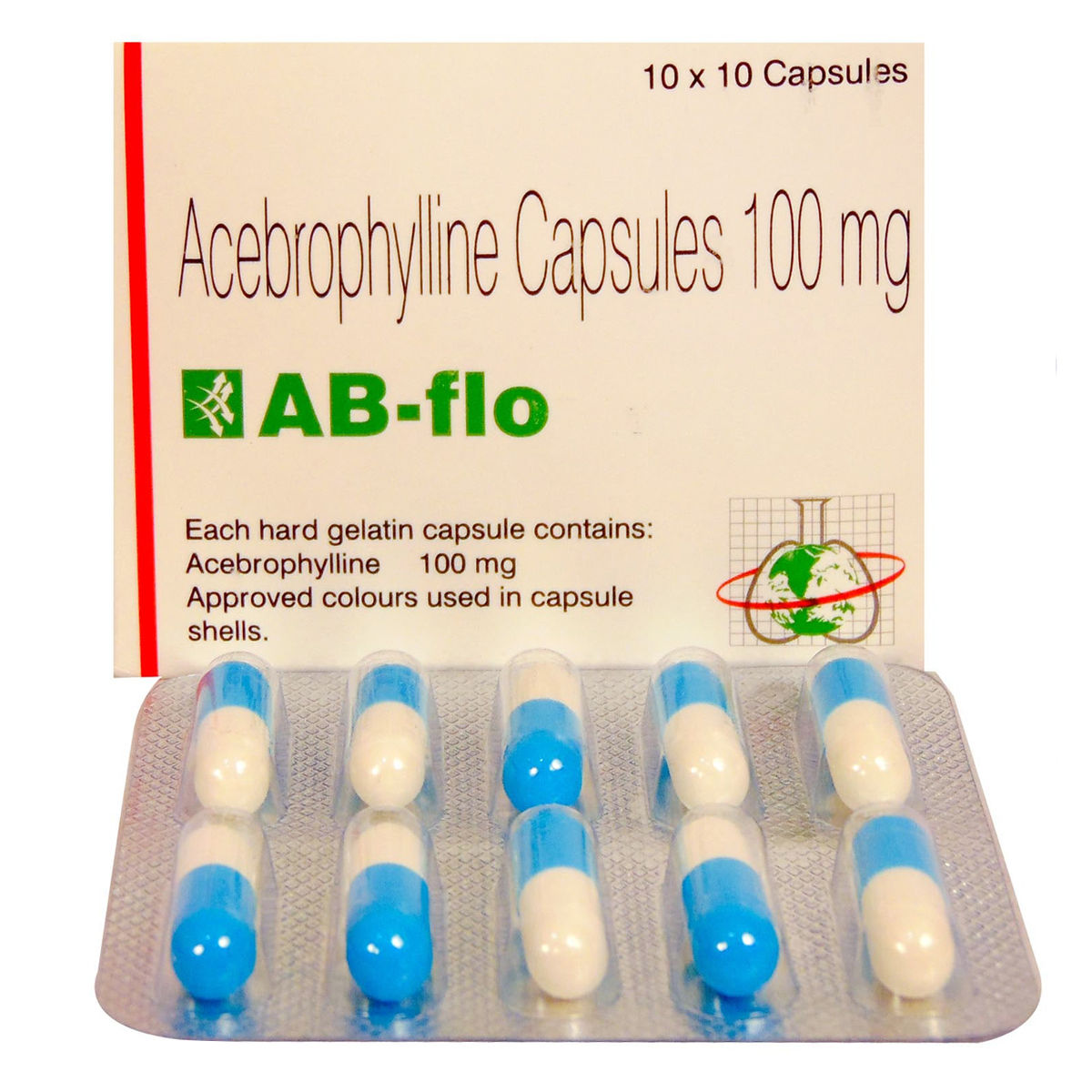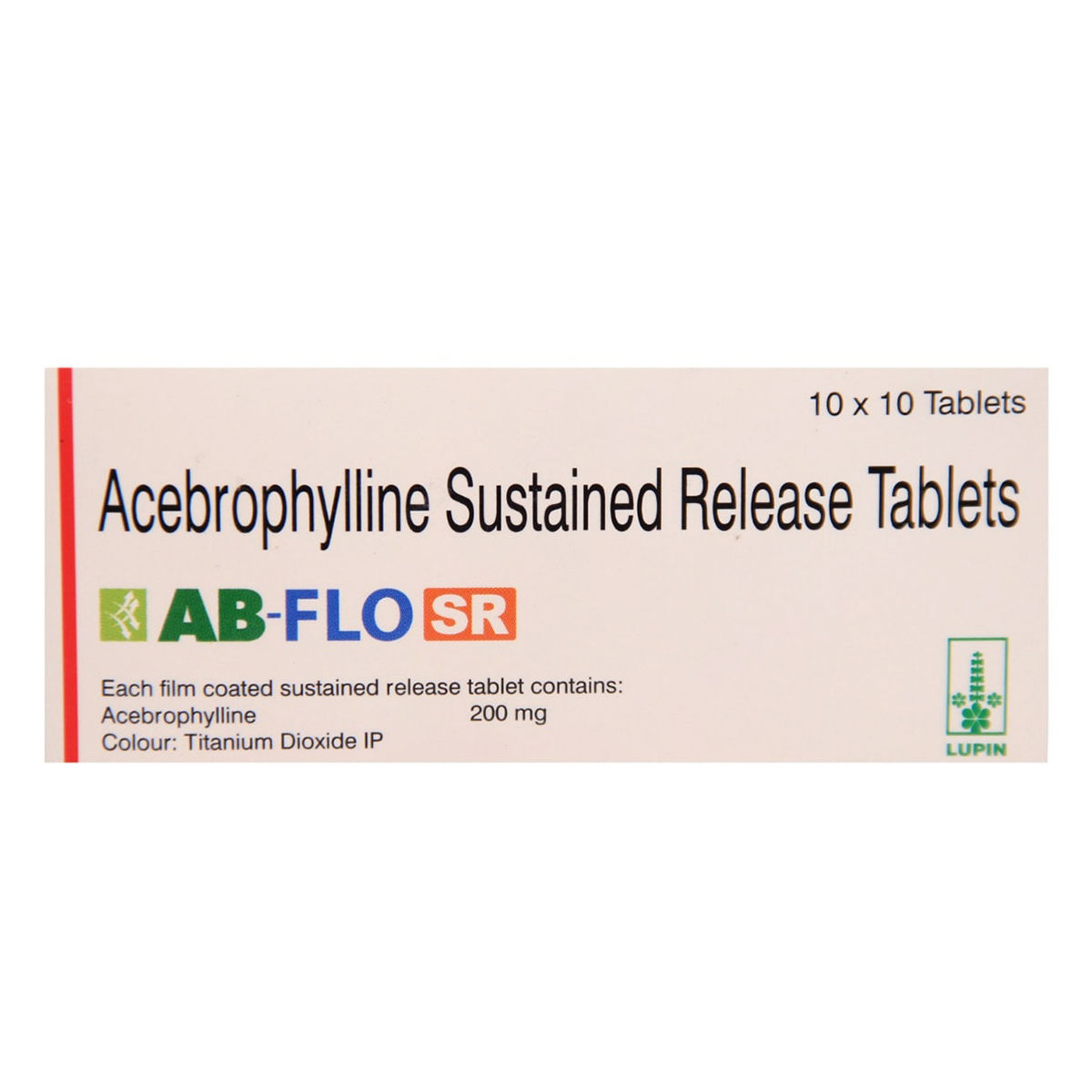Acebrophylline
About Acebrophylline
Acebrophylline is used to prevent and treat symptoms of asthma and chronic obstructive pulmonary disease (COPD). Asthma is a chronic (long-term) respiratory condition in which airways narrow, swell, and produce extra mucus, leading to difficulty in breathing. COPD is a group of lung diseases with emphysema (shortness of breath) and chronic bronchitis (inflammation of the lining of bronchial tubes).
Acebrophylline contains Acebrophylline, which works by relaxing muscles and widening the airways of the lungs. Additionally, Acebrophylline also acts as a mucolytic (cough/sputum thinner) agent and helps in thinning and loosening phlegm (mucus) in the lungs, windpipe and nose. Therefore, it helps cough out easily and makes breathing easier by opening airways.
Take Acebrophylline as prescribed. Your doctor will recommend how often you take Acebrophylline based on your medical condition. Some people may experience diarrhoea, nausea, vomiting, dizziness, heartburn, stomach discomfort, skin rash or drowsiness. Most of these side effects of Acebrophylline do not require medical attention and gradually resolve over time. However, if the side effects persist or worsen, please consult your doctor.
If you are allergic to Acebrophylline or any other medicines, please tell your doctor. If your breathing worsens or you often wake up at night with asthma, experience chest tightness in the morning or last longer than usual, please consult a doctor immediately, as these might be signs indicating that your asthma is not controlled properly and requires an alternate or additional treatment. Regular monitoring of potassium levels is recommended while taking Acebrophylline as it may cause low potassium levels in the blood. If you are pregnant or breastfeeding, it is advised to inform your doctor before using Acebrophylline. Do not take Acebrophylline if you have a heart rhythm disorder that causes fast heartbeats. Avoid taking Acebrophylline if you have low blood pressure, irregular heartbeats, hemodynamic instability (unstable blood pressure), a heart attack, or kidney or liver diseases. If you have hyperthyroidism (overactive thyroid), irregular heartbeats, viral infections, heart failure, high blood pressure, fits, gastric or duodenal ulcers, heart diseases, kidney or liver insufficiency, inform your doctor before taking Acebrophylline.
Uses of Acebrophylline
Medicinal Benefits
Acebrophylline is a bronchodilator and mucolytic (mucus thinner) agent that is used to treat symptoms of asthma and chronic obstructive pulmonary disease (COPD). Acebrophylline works by relaxing muscles and widening the airways of the lungs. Additionally, Acebrophylline helps in thinning and loosening phlegm (mucus) in the lungs, windpipe and nose. Therefore, it helps cough out easily and makes breathing easier by opening airways. Acebrophylline helps prevent an asthma attack and allows you to exercise freely if it is taken before exercise.
Directions for Use
Storage
Side Effects of Acebrophylline
Diarrhoea
Nausea
Vomiting
Dizziness
Heartburn
Stomach discomfort
Skin rash
Drowsiness
Drug Warnings
If you are allergic to Acebrophylline or any other medicines, please tell your doctor. If your breathing worsens or you often wake up at night with asthma, experience chest tightness in the morning or lasts longer than usual, please consult a doctor immediately as these might be signs indicating that your asthma is not controlled properly and requires an alternate or additional treatment. Regular monitoring of potassium levels is recommended while taking Acebrophylline as it may cause low potassium levels in the blood. If you are pregnant or breastfeeding, it is advised to inform your doctor before using Acebrophylline. Do not take Acebrophylline if you have heart rhythm disorder that causes fast heartbeats. Avoid taking Acebrophylline if you have low blood pressure, irregular heartbeats, hemodynamic instability (unstable blood pressure), had a heart attack, kidney or liver diseases. If you have hyperthyroidism (overactive thyroid), irregular heartbeats, viral infections, heart failure, high blood pressure, fits, gastric or duodenal ulcers, heart diseases, kidney or liver insufficiency, inform your doctor before taking Acebrophylline.
Drug Interactions
Drug-Drug Interaction: Acebrophylline may interact with water pills (furosemide), medicines used to treat gout (allopurinol), antacid (cimetidine), antibiotics (ciprofloxacin, erythromycin, amoxicillin, doxycycline), drugs used to lower high blood pressure (diltiazem, verapamil), heart-related medicines (isoprenaline), anthelmintic (thiabendazole), corticosteroids (prednisone) and oral contraceptives (ethinylestradiol).
Drug-Food Interaction: Acebrophylline may interact with alcohol. Therefore, avoid intake of alcohol with Acebrophylline as it may increase drowsiness. Also, avoid or limit the intake of caffeine with Acebrophylline as it may cause side effects.
Drug-Disease Interaction: Avoid taking Acebrophylline if you have low blood pressure, irregular heartbeats, hemodynamic instability (unstable blood pressure), had a heart attack, kidney or liver diseases. If you have hyperthyroidism (overactive thyroid), irregular heartbeats, viral infections, heart failure, high blood pressure, fits, gastric or duodenal ulcers, heart diseases, kidney or liver insufficiency, inform your doctor before taking Acebrophylline
Drug-Drug Interactions Checker List:
Safety Advice

Alcohol
unsafeAvoid consumption of alcohol with Acebrophylline as it may increase drowsiness. Please consult a doctor before consuming alcohol with Acebrophylline.

Pregnancy
unsafeAcebrophylline is not recommended for pregnant women. Please consult a doctor before using Acebrophylline if you are pregnant.

Breast Feeding
cautionIt is unknown whether Acebrophylline is excreted in human milk. Please consult a doctor before taking Acebrophylline if you are breastfeeding.

Driving
safeAcebrophylline usually does not affect your ability to drive or operate machinery.

Liver
cautionTake Acebrophylline with caution, especially if you have a history of Liver diseases/conditions. The dose may be adjusted by your doctor as required.

Kidney
cautionTake Acebrophylline with caution, especially if you have a history of Kidney diseases/conditions. The dose may be adjusted by your doctor as required.

Children
cautionAcebrophylline should be used with caution in children in doses as prescribed by a doctor.
Habit Forming
Diet & Lifestyle Advise
Eat foods rich in potassium such as tomatoes, bananas, asparagus, oranges, potatoes, avocados, dark leafy greens and beetroots as potassium is important for lung function and a potassium deficiency may cause breathing problems.
Drink plenty of fluids every day to thin mucus which makes it easier to cough out.
Avoid foods such as cabbage, beans, garlic, onions, shrimp, pickled food, dried fruits, fried foods, carbonated drinks, wine, bottled lemon and lime juice as it may worsen asthma symptoms.
Exercise regularly to strengthen your breathing muscles and boost your immune system. Learning breathing exercises will help you move more air in and out of your lungs.
Do meditation, deep breathing, regular exercise and try progressive muscle relaxation techniques to get relief from stress and reduce the risk of an asthma attack.
Quit smoking as it may reduce the effectiveness of the Acebrophylline and irritate the lungs worsening breathing problem.
Patients Concern
Disease/Condition Glossary
Asthma: It is a chronic (long-term) respiratory condition in which airways narrow, swell, and produce extra mucus, leading to difficulty in breathing. The symptoms of asthma include wheezing (whistling sound while breathing), shortness of breath, chest tightness and cough, especially at night. The symptoms of mild persistent asthma may occur more than 2 times a week and up to 4 nights in a month, whereas, in the case of severe persistent asthma, the symptoms occur several times every day and most nights. The treatment for asthma includes medication, breathing exercises and self-care.
Chronic obstructive pulmonary disease (COPD): It is a group of lung diseases with emphysema (shortness of breath) and chronic bronchitis (inflammation of the lining of bronchial tubes). The major cause of COPD is smoking tobacco. Also, long-term exposure to fumes and chemicals may lead to COPD. The symptoms include chronic cough, shortness of breath or wheezing (whistle sound while breathing).
FAQs
Acebrophylline is used to prevent and treat symptoms of asthma and chronic obstructive pulmonary disease (COPD). It works by relaxing muscles and widening the airways of the lungs.
Acebrophylline should be used with caution in patients suffering from fits as it may worsen the condition. Therefore, inform your doctor if you have a history of fits before taking Acebrophylline so that the dose may be adjusted or an alternate medicine may be prescribed.
No, you are not recommended to take erythromycin with Acebrophylline as co-administration of these medicines may increase the risk of adverse effects of Acebrophylline. However, please consult a doctor before using other medicines with Acebrophylline.
You are recommended to avoid taking Acebrophylline if you are allergic to acebrophylline, ambroxol, theophylline or suffering from irregular heartbeats, hemodynamic instability (unstable blood pressure), low blood pressure, liver or kidney disorders or had heart attack. However, inform your doctor if you have any of these conditions before taking Acebrophylline.
No, you are not recommended to smoke while taking Acebrophylline as it may reduce the effectiveness of Acebrophylline.
No, you are not recommended to stop taking Acebrophylline without consulting your doctor as it may worsen the condition or cause recurring symptoms. Therefore, take Acebrophylline for as long as your doctor has prescribed it and if you experience any difficulty while taking Acebrophylline, please consult your doctor.
No, Acebrophylline does not relieve sudden asthma symptoms. Therefore, it is advised to carry a rescue inhaler always to treat sudden asthma symptoms.
No, Acebrophylline is not a steroid. Acebrophylline is a bronchodilator and mucolytic (mucus thinner) agent.
You are recommended to take Acebrophylline for as long as it is prescribed by your doctor. The duration depends on the cause of illness and the underlying disease.
No. Acebrophylline is not an antibiotic.
Birth control pills may interfere with Acebrophylline clearance, increasing its levels and risk of side effects. Therefore, if you are taking birth control pills, inform your doctor as the dose of Acebrophylline needs to be reduced.
Acebrophylline should be taken exactly as advised by the doctor. Take it with food to avoid stomach upset. Swallow it as a whole with a glass of water. Do not open, crush or chew it.
If you are taking furosemide along with Acebrophylline, you should take caution as combined use of these medicines may decrease potassium levels. Therefore, it is necessary to regularly monitor potassium levels.
Acebrophylline contains Acebrophylline, which works by relaxing muscles and widening the airways of the lungs. Additionally, Acebrophylline also acts as a mucolytic (cough/sputum thinner) agent and helps in thinning and loosening phlegm (mucus) in the lungs, windpipe and nose. Thereby, it helps cough out easily and makes breathing easier by opening airways.
You are recommended to avoid consuming large quantities of caffeine-containing food or drinks as it may increase the risk of side effects.
You are advised to consult your doctor before taking Acebrophylline if you are pregnant or breastfeeding.
Acebrophylline may cause side effects such as nausea, vomiting, diarrhea, heartburn, dizziness, and stomach discomfort. If these side effects persist or worsen, please consult your doctor.
Store Acebrophylline at room temperature. Protect from moisture. Keep it out of reach of children.









